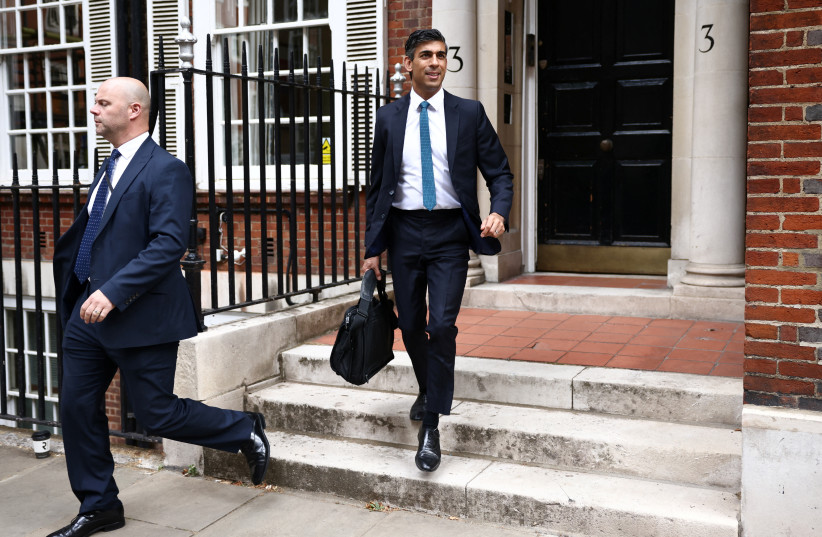Rishi Sunak, the new prime minister of the UK, spoke in favor of recognizing Jerusalem as Israel’s capital earlier this year, part of a record – albeit a short one – of pro-Israel statements and policies in his time in government.
At a Conservative Friends of Israel event in August, Sunak said Jerusalem is “undisputedly the historic capital. Clearly, there’s a very strong case for it to be recognized… so it is something I would like to do.”
“You will have my total commitment that I will fight very hard for the security of people in Israel,” he vowed.
Prime Minister Yair Lapid on Tuesday congratulated Sunak upon becoming prime minister.
“Israel and the United Kingdom are close allies,” he wrote on Twitter, adding: “We share not only mutual interests but an unwavering commitment to democratic values. I look forward to working together to shape a stronger, safer future for both our countries and peoples.”

In his address to the Conservative Friends of Israel, Sunak called to “put snapback sanctions on the table,” meaning to reinstate all sanctions on Iran, because they are unlikely to return to a nuclear deal with world powers.
He also argued that the UK should proscribe Iran’s Islamic Revolutionary Guard Corps.
Sunak pledged that he would be “tougher” in criticizing incitement by the Palestinian Authority.
“It upsets me that there’s an organization which glorifies terrorist attacks on Israel, spreads hate in its schools, and we need to call that out and look at what the UN does to support it and make sure that they’re accountable with the funding and the resources that they get and how they’re using it,” he said.
"It upsets me that there’s an organization which glorifies terrorist attacks on Israel, spreads hate in its schools and we need to call that out and look at what the UN does to support it and make sure that they’re accountable with the funding and the resources that they get and how they’re using it."
Rishi Sunak
As undersecretary for local government, Sunak moved in 2018 to reinstate a ban on boycotts of Israel by local councils, after a court upheld the policy following a challenge by pro-Palestinian activists.
Sunak wrote in London’s Jewish News during the Conservative leadership race this summer that he supports a bill extending the prohibition against BDS to all public bodies and called the boycotts a form of antisemitism. Beyond that, he did not mention any policies relating to Israel.
Rishi Sunak has a limited portfolio on Jews and Israel
Sunak has just one tweet in his seven-year political career with the word “Israel” in it.
“This morning, I met with Israeli Finance Minister Avigdor Liberman to discuss our ambitious UK-Israel Free Trade Agreement,” he wrote. “I also offered my condolences over last night’s terror attack and assured him that the UK stands with the people of Israel against terrorism.”
A search for tweets by Sunak about Jews or antisemitism turned up empty, but he did tweet once about International Holocaust Remembrance Day.
Sunak, who is Hindu, wrote in the Jewish News that freedom of religion in the UK is “incomplete” because, while he feels safe when he visits his temple, that often is not the case for Jews in their community institutions.
“I am extremely concerned by the rise in reports of antisemitic hate,” he wrote. “As prime minister, I will continue the work of this government to support Jewish communities across the country... This is not an issue to be equivocal about: Everyone across Parliament and the country must take a robust position on eliminating antisemitism and I am determined to ensure this scourge on our society is eradicated.”
Lord Stuart Polak, honorary president of Conservative Friends of Israel, earlier this year said Sunak was “very forceful in promoting anti-boycott policies as minister for local government and was very helpful in the Treasury. All the people around him are good friends of Israel, and he has shown interest in the subject.”
